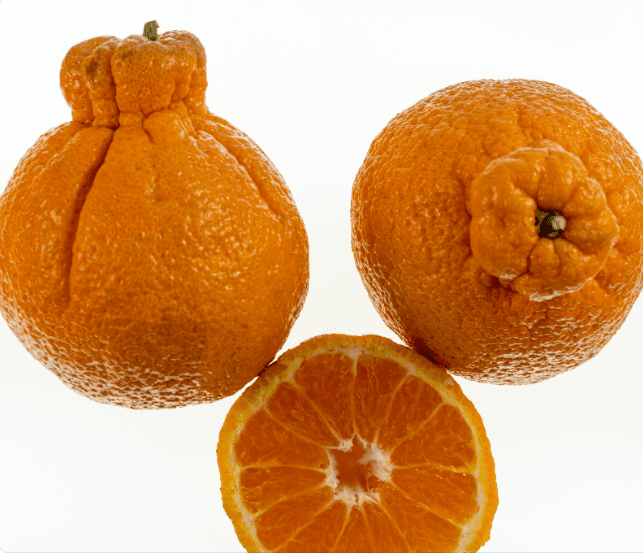Amazing Dekopon – Sumo Citrus
Sumo Citrus is also known as Sumo Oranges distinguishes itself from ordinary oranges in a variety of ways. The sensation of eating a Sumo Citrus is unlike anything else, beginning with a wonderfully sweet taste that lingers in the mouth.
It’s easy to peel, seedless, and doesn’t produce a mess, making it a fantastic choice for healthy on-the-go snacking on the go. The question is, where does Sumo Citrus get its name from?
Sumo Citrus has a unique history that distinguishes it from any other fruit in the world. It was in Japan in the 1970s when a grower began cultivating the famous seedless variety with the goal of creating the perfect citrus fruit.
The result was the legendary seedless variety. Because of its unusual top knot, it became known as the “dekopon” in Japan, and it has been much sought after by citrus connoisseurs since that time.
Only skilled producers in California who are familiar with the special features of Sumo Citrus are able to cultivate it, allowing fans to enjoy the fruit for eight months out of the year while it is in season.
Hand-pruned Sumo Citrus fruits are ripened on the tree, collected in tiny totes rather than massive bins, and transported in special air-ride trailers to prevent their delicate skin from being crushed during transport.
Upon inspection, each fruit is assessed for sweetness and must meet the strictest requirements for taste, size, and texture.
According to Rick Johnston, Executive Vice President of Sales and Marketing for Sumo Citrus, “What they accomplish is remarkable.” “The devotion and enthusiasm of each individual grower for providing a superb citrus experience is absolutely motivating.”
“Our product received a resoundingly positive response throughout the previous season. This season’s crop has been of great quality, and we are delighted to be able to put them back into the hands of our customers.”
The brand’s logo and packaging have been updated for this year’s launch. The new design incorporates brilliant colors and motifs that pay homage to the company’s Japanese history.
Sumo Citrus is also a healthy snack option because of its citrus flavor. In addition to being correctly portioned and bursting with vitamin C, each fruit has been Non-GMO Project Verified.
Why don’t check it yourself what all the fuss is about by giving one a shot yourself!
Don’t call it an orange; name it something else that’s equally good.
Information On Sumo Citrus – Sumo Oranges
Sumo comes to America
Sumo Citrus is a marketing term for the fruit Shiranui, which is popularly known in its native Japan as the Dekopon, which is also a brand name.
The first word of the fruit dates back to the early 1970s. The self-proclaimed “Fruit Detective” David Karp said in a 2011 Los Angeles Times article headlined “The Dekopon arrives in California” that by the 1990s, it had become a popular, beloved fruit in Japan, selling for up to $10 per piece.
Karp described the years-long struggle of American cultivators to obtain the seedlings. The authorities required those who sneaked the stuff into the country to cut down trees out of worry that the product would spread deadly plant viruses.
Eventually, Suntreat, which has now morphed into AC Brands, was able to legally establish Shiranui orchards in California, a secretive endeavor.
The participating growers “had signed nondisclosure and exclusive marketing agreements with Suntreat,” wrote Karp. No one was permitted to utter the word ‘Dekopon’.
By 2011, the business was prepared to reveal its secret and introduce the new fruit to the United States under a different name.
AC Brands believed that the names shiranui and Dekopon were incomprehensible to US consumers. Therefore, it developed something novel.
“The Sumo Citrus brand was formed due to the appearance of the fruit,” Sunnia Gull, director of brand management at AC Brands, explained to CNN Business.
Compared to a regular mandarin, “it’s this enormous fruit” with a “top knot” resembling that of a Sumo wrestler, she explained.
When branding anything new, such as a hybrid fruit, choose a name that is “sociable, clear to spell, and easy to order for in a store,” corresponding to David Placek, creator, and president of Lexicon Branding, a company that promotes businesses name their goods.
In expansion, he stated that by taking advantage of the fruit’s appearance as a selling point, AC Brands is converting a possible disadvantage into a benefit.
Ultimately, he added, marketers are “searching for a story” that explains to consumers why this product is superior to the competition and why they should purchase it.
On top of being one of the largest and sweetest mandarins in the world, Sumo Citrus is also well-known for both its great taste and distinctive appearance.
Sumo Citrus, which originated in Japan, today has a global presence as a result of the efforts of dedicated growers who care for the fruit year after year and ensure that each Sumo Citrus fulfills the highest quality standards.
When compared to regular oranges, the famous Sumo Citrus provides the most intense citrus flavor possible. Because they’re easy to peel and seedless, they’re delicious and juicy, and they don’t produce a mess.
Every year, from January through April, it is available throughout the country. #sumocitrus #notanorange #sumocitrus























